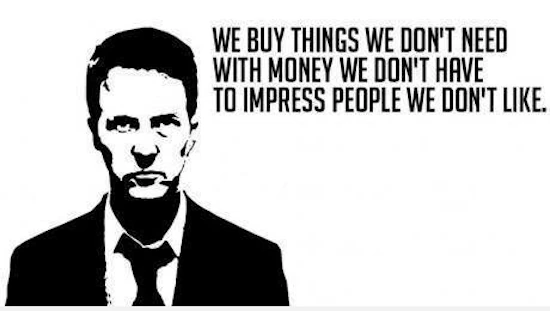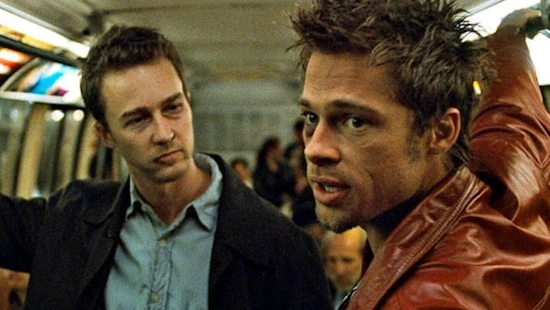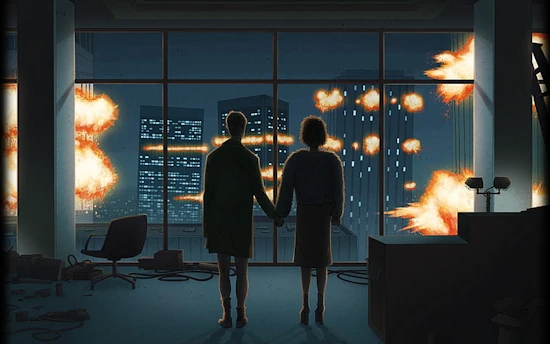“Fight Club”, penned by Chuck Palahniuk in 1996 and later adapted into a film in 1999, delves deep into the spiritual struggle against the tide of materialism and consumerism. This narrative challenges its audience to ponder their own existence within a society deeply entrenched in capitalist values—prompting a reevaluation of identity, mortality, and the adverse effects of both societal conformity and rebellion. Through its vivid portrayal of characters and their quest for meaning beyond tangible possessions, “Fight Club” offers a biting critique of the emptiness fostered by consumer culture and the societal norms that emasculate individuals.

As the article unfolds, it will scrutinize the many layers of this complex narrative—from the cage of consumerism to the crisis of masculinity and the quest for spiritual fulfillment. Exploring symbolic elements like Tyler Durden’s insurrection against capitalism and the paradoxical nature of Fight Club itself, the discussion will illuminate how these themes offer a gateway to understanding the deeper spiritual battles. The exploration of existential themes, the craving for connections in a fragmented society, and the ultimate desire for rebirth through destruction provide a rich tapestry for analyzing how Palahniuk’s narrative wrestles with the spiritual realm’s fight against the allure of materialism and consumerism.
Consumerism as a Cage
In “Fight Club”, the portrayal of consumerism as a confining force is vividly depicted through Tyler Durden’s critical rhetoric. He articulates that the societal push towards acquiring more has led individuals to spend excessively on unnecessary items, fostering a cycle of wastefulness. This critique is echoed in the narrative, stressing that happiness isn’t measured by material wealth, which starkly contrasts with the consumer-driven belief that well-being hinges on market purchases.
The film and novel delve deeper into the societal implications of this obsession with materialism, suggesting it strips individuals of their uniqueness and purpose. This is portrayed through the cyclical nature of consumerism described in the film, where problems are ‘solved’ by ever-newer products, offering no real improvement to the consumer’s life quality. It paints a picture of a society where consumerism not only dictates economic activity but also molds cultural identities and social interactions, leading to a superficial community disconnected from genuine human values.
Moreover, “Fight Club” challenges the viewer to recognize the profound spiritual and environmental costs of unchecked consumerism. It reveals how this relentless pursuit can lead to a profound disconnection from nature and escalate global issues such as inequality and environmental degradation. The narrative pushes for a radical shift in values, advocating for a move away from materialism towards a more sustainable and spiritually fulfilling existence. This shift is crucial not only for individual fulfillment but also for the collective future, urging a reevaluation of the consumerist lifestyle that dominates modern society.
The Crisis of Masculinity
In “Fight Club”, the unnamed protagonist, alongside the charismatic Tyler Durden, establishes a fight club as a radical form of male bonding and a rejection of societal norms that they perceive as emasculating. This setup serves as a stark critique of toxic masculinity and the destructive outcomes of unbridled aggression. The club, exclusive to men, becomes a space where participants feel they can reclaim a sense of power and vitality often stifled by societal expectations.
The narrative delves into the use of violence as a dubious tool for men to regain a sense of control and masculinity. Tyler Durden, epitomizing this reclaimed virility, is portrayed as strong, confident, and in command—a stark contrast to the disenchanted men drawn to the fight club. These men, including the Narrator, find a perverse solace in the physicality and pain of the fights, which they believe makes them feel more alive and assertive.
Addressing the broader cultural context, “Fight Club” emerged during a period of significant discourse on American masculinity, paralleling other late 90s films like “American Beauty” and “American History X”. These narratives often highlighted a perceived crisis in masculinity through various lenses, including the impacts of capitalism and the shifting expectations of men in society. Through its visceral portrayal of underground fight clubs and the extreme measures men take to feel empowered, the film critiques not only the capitalist drives that shape identities but also the extreme lengths to which men go to assert traditional masculine roles in a rapidly changing world.

Spiritual Emptiness and the Quest for Meaning
In “Fight Club”, the portrayal of spiritual emptiness is intricately woven through the characters’ desperate search for meaning beyond material possessions. The film suggests that the suppression of one’s authentic self is a significant contributor to mental health issues. This repression, often shaped by societal expectations, leads individuals to undervalue their emotional well-being, thereby exacerbating feelings of emptiness and disconnection.
Exploring the Metaphor of Violence
The film’s use of violence serves as a powerful metaphor, illustrating the internal conflict between spiritual fulfillment and materialistic satisfaction. This struggle is vividly brought to life through the underground fight clubs and Project Mayhem, which are not just physical but also symbolic arenas where individuals seek liberation from the consumerist lifestyle. These groups provide a distorted type of religious experience, with Tyler Durden emerging as a messianic figure. The blurred lines between religion and cult within these groups underscore the deep-seated human need for belonging and purpose, which the consumerist society fails to satisfy.
Pathways to Overcoming Spiritual Emptiness
Addressing spiritual emptiness involves a multifaceted approach that includes nurturing the spirit, caring for the physical body, and engaging in meaningful community interactions. Steps to replenish one’s spiritual well-being involve desiring a divine guidance acknowledging and rectifying one’s sins. This holistic approach highlights the importance of integrating spiritual practices with everyday life to combat the feelings of isolation and emptiness that stem from viewing oneself as separate from the rest of existence. By recognizing the interconnectedness of all life, individuals can begin to see beyond the veil of separation, fostering a more fulfilled and unified existence.
Tyler Durden: A Metaphor for Rebellion
Tyler Durden, portrayed by Brad Pitt, emerges as a radical symbol of defiance against societal norms. He embodies the spirit of anarchy and the rejection of societal structures, advocating for a life free from the shackles of consumerism. As the co-founder of Fight Club, Tyler’s actions and philosophies reflect a deep-seated aversion to the capitalist culture that, he argues, erodes individuality and freedom. The need for self-determination is also highlighted by the intermittent love relationship he engages in with Marla; on the one hand he feels the need to build deep bonds and on the other he is incapable of doing so since he is adept at the throwaway mentality. His character is not just a figment of the narrator’s imagination but a vivid representation of the Freudian id, which prioritizes the pleasure principle and harbors destructive impulses.
In the narrative of “Fight Club”, Tyler’s inception from the narrator’s psyche and his subsequent rise as the leader of Project Mayhem illustrate a modern-day messianic journey. This journey mirrors the biblical story of Jesus in several respects, with Tyler initiating Fight Club as his ministry, gathering disciples, and ultimately facing a metaphorical ‘death’ with the destruction of the Parker-Morris building. This parallel extends to the use of religious imagery throughout the novel, where elements like the psychiatrist representing God, and Tyler akin to Christ, enrich the narrative with a sacrilegious critique of both religion and materialism.
Moreover, Tyler’s philosophy challenges his followers to liberate themselves from the consumerist chains that bind them. He views violence as a tool to assert dominance over oppressive employers and to reclaim control over one’s life. However, the film also critically portrays the escalation of Fight Club into Project Mayhem, highlighting the dangers of such unchecked rebellion. It serves as a cautionary tale about the potential for such movements to transform into the very tyrannies they aim to dismantle, questioning the sustainability of revolt as a path to true freedom.
Violence as Catharsis and Destruction
In Fight Club, the allure of violence is depicted not only as a means of destruction but also as a cathartic release for the characters entangled in the numbing effects of consumerism. The physical confrontations within the underground fight clubs are portrayed as a raw form of therapy, where the participants experience a visceral sense of being alive, contrasting sharply with their otherwise mundane and unfulfilling lives. These men find the tangible pain and immediate reality of their injuries more authentic than the superficiality of their day-to-day roles in a consumer-driven society.

However, the narrative escalates as these bouts of violence grow into Project Mayhem, a disturbing evolution from controlled chaos to anarchic terrorism. This progression highlights the inherent dangers of using violence as a tool for social change. The destructive outcomes of Project Mayhem, including loss of life and significant property damage, serve as a grim reminder of the consequences that can arise when the lines between ideological rebellion and harmful reality are blurred. The film intricately portrays this through the final scenes where the collapse of financial institutions is witnessed, symbolizing the catastrophic potential of such unchecked aggression.
The paradoxical nature of the fight clubs is further explored through the romanticization of injuries and trauma. Participants in these brutal encounters view their scars and wounds as badges of honor—a perverse validation of their existence outside the confines of societal norms. This twisted perception of violence as purifying, and the degradation they endure as transcendent, challenges the viewer to question the true cost of rejecting consumerism through such extreme measures. The film’s portrayal of these dynamics not only critiques the spiritual emptiness induced by materialism but also probes the volatile intersection of destruction and self-identity in the quest for meaning.
The Paradox of Fight Club
“Fight Club” masterfully employs visual and auditory elements reminiscent of advertising techniques, subtly critiquing the pervasive influence of corporate giants. These elements are designed to provoke viewers into questioning the role of large corporations in their lives, often portrayed as benevolent providers of convenience but, in reality, acting as controlling entities that dictate consumer behavior and values.
At the heart of the narrative lies a stark choice: the prevailing capitalist system represented by everyday consumerism, or the extreme alternative, Project Mayhem. Led by the charismatic and anarchistic Tyler Durden, Project Mayhem is depicted as both a critique and a product of capitalist realism. This group, while initially seeming to offer escape and rebellion against consumerist shackles, ironically mimics the very systems it aims to dismantle, using destruction and chaos as its tools.
The central tenet of Fight Club, encapsulated by the rule “You do not talk about Fight Club”, serves multiple symbolic purposes. It fosters a sense of mystery and exclusivity, essential for drawing in more members, while also embodying the broader thematic struggle of the narrative. This rule, paradoxically meant to be broken to ensure the club’s expansion, mirrors the broader contradictions within the film. It suggests that silence about one’s struggles is akin to a societal expectation, where personal suffering is to be endured rather than discussed openly. This rule, and its inevitable violation, encapsulate the film’s exploration of personal and societal paradoxes, where the surface contradictions reveal deeper truths about rebellion, identity, and the human condition.
Conclusion
Through its intricate weaving of narrative and thematic explorations, “Fight Club” emerges not just as a critique of consumerism’s grip on society, but also as a profound commentary on the quest for identity amidst the cacophony of modern life. It underscores the deep-seated yearning for spiritual and existential significance that material wealth cannot satisfy. The journey through Tyler Durden’s creation and the eventual realization of its consequences paints a stark portrait of the battle between embracing societal norms and the destructive allure of rejecting them entirely.
The narrative’s culmination in the visual spectacle of societal structures collapsing serves as a poignant metaphor for the potential rebirth that can follow personal and collective disillusionment. By delving into the complexities of masculinity, the allure of violence as a means of catharsis, and the paradoxical nature of the fight against consumer culture, “Fight Club” offers a mirror to the audience, reflecting the multifaceted struggles of contemporary existence. In its conclusion, the film beckons viewers to contemplate the real essence of fulfillment and the paths we choose in our search for meaning in a world saturated with consumerist ideals.
Do you ever feel like a Tyler Durden? Do you also feel that owning so many things makes life less intense and authentic? Are you fighting a spiritual battle? Then you will find our profound personality tests very interesting, no doubt about that!
TAKE THE AWARENESS TEST
TAKE THE AWAKENING TEST
TAKE THE GREAT PERSONALITY TEST
MINI SELF-ADMINISTERED TEST: ARE YOU A MATERIALIST/CONSUMERIST PERSON?
Read the sentences below and select the ones you agree with and that you think make the most sense.
Count the number of boxes checked and read the corresponding profile.
0: You are not materialist and consumerist at all
1-2: You are hardly materialist and consumerist
3-4: You are quite materialist and consumerist
5-6: You are extremely materialist and consumerist
